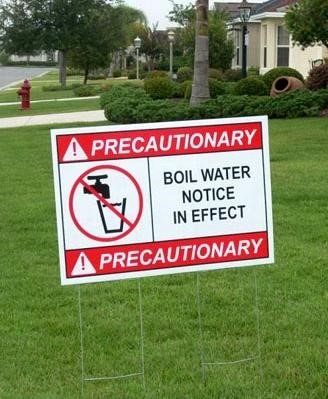Risk, Crisis, and General Communication Webinar
- Watch the webinar recording (November 28, 2023)
- Small Drinking Water Systems Webinar Series
About the Webinar

1. Conversations With Customers: What We’ve Learned From Talking With Them
While Cleveland Water has more than 25 years of sampling records that show its water is consistently well below the federal action level for lead, it is the largest public water system in Ohio and has almost 25% of the state’s total estimated lead service lines (LSLs). Since funding become available for LSLRs, they have been developing and implementing a proactive LSLR Program using adaptive management principles to create long-term success while working within the requirements of changing federal and state laws. This presentation will highlight lessons learned from talking with customers during LSLRs, phone calls to both Cleveland Water Department’s phone lines dedicated to lead and water quality inquires, and presentations about water.
Presenter: Brenda Culler, Cleveland Water. Brenda has been involved in Lake Erie and water quality communications for 23 years, including as a reporter. She was with the Ohio Department of Natural Resources Office of Coastal Management for 15 years prior to joining Cleveland Water in October 2017, first as the project coordinator for Lake Health and Water Quality Communications and now as the lead program manager. In her current role, she leads the team developing the Cleveland Water Department’s Lead Service Line Replacement Plan and applying for millions in federal funding to remove lead water services. She specializes in taking scientific data, legislative requirements, and engineering and industry standards to create customer-focused materials on topics ranging from source water to the treatment process to premise plumbing. She led the development of Cleveland Water’s Lead Awareness Campaign and system-wide Childcare Lead Service Line Removal Program.
2. Drinking Water Risk Communication Toolkit
With many emerging issues facing drinking water and societal changes in how we access and share information, communicating about drinking water and public health risks can be challenging. This presentation discusses practical tools and resources used in Minnesota to help public water systems communicate about risk with their customers, including the Drinking Risk Communication Toolkit, and will include examples of how the toolkit has been used and future areas of expansion.
Presenter: Alycia Overbo, Minnesota Department of Health. Alycia is the supervisor of the Communications and Strategic Initiatives Unit at the Minnesota Department of Health. In this role, she oversees planning, evaluation, and coordination of communications and strategic policy initiatives for the public Drinking Water Protection program. Alycia is a Ph.D. candidate in the Water Resources Science program at the University of Minnesota, where she researches sources of chloride pollution to Minnesota groundwater and surface waters.
3. EPA Flint Water Response: Risk Communication Case Study
This presentation will highlight EPA’s drinking water response in Flint, Michigan, including the communication challenges. EPA’s engagement strategy will also be discussed.
Presenter: Diane Russell, EPA Region 5. Diane is a community involvement coordinator with EPA’s Region 5, where she leverages her position in a Michigan field office to maximize engagement and relationship building in communities experiencing an emergency or living through long-term cleanups. Over her nearly 15-year career, she has become a national subject matter expert in community engagement specializing in science and risk communication. Some of her high-profile projects include dioxin and furan cleanup in and along the Tittabawassee River, PCB cleanup in and along the Kalamazoo River, DDT and PBB cleanup at the Former Velsicol Chemical Plant in St. Louis, Missouri, PFAS and heavy metal waste removal in Rockford, Michigan from former tannery operations by Wolverine World Wide, and lead the community engagement teams in the Flint Water Response and the East Palestine Train Derailment in Ohio. Diane has also leveraged resources to empower communities to effectively participate in decision-making including development and support of five Superfund Community Advisory Groups (CAGs) within the region, management of a multi-community, long-term facilitation support contract, and lead a multi-agency agreement bringing over $1.5 million dollars to community partners for fish consumption advisory education. She prioritizes award-winning methods in her work and integrates teaching and on-the-ground experience to mentor young professionals.
